Chantelle Otten on shame-free sex and the education you never had
Former Catholic schoolgirl-turned ‘sex detective’ Chantelle Otten delivers the sex education you never had.

Chantelle Otten attended a Catholic school where, she says, she didn’t receive much sex education.
“I used to get blood noses super often,” she writes in her new book, The Sex Ed You Never Had (Allen & Unwin).
“I was so uneducated that I thought I was getting my period through my blood nose!”
Since those teenage years, Otten has dedicated herself to learning about sex and sexuality. She is now a professional sexologist, although she also describes herself as a detective into people’s sex lives, saying she learns as much from her patients – and, indeed, her own experiences – as she does from science textbooks.
Sexology is the scientific study of human sexual experience, and a sexologist is an expert in the field. Otten uses her knowledge to educate the public on sexual health and wellness, and to provide one-on-one sex therapy with individuals.
“Any concern you have, it’s my job to find out where it’s coming from,” she says. “We want to make sure that sex is fun, pleasurable, pain-free and shame-free.”
She has more than 130,000 followers on Instagram, consults for dating app Bumble Australia and hosts several podcasts.
“I’m very busy,” she says. “I’ve always been someone to burn the candle at both ends, and I wouldn’t have it any other way.”
Her new book, The Sex Ed You Never Had, is an educational text written with conversational flair. It’s a nostalgic throwback to Kaz Cooke’s Girl Stuff, an iconic puberty guide that kids read through giggles in school libraries in the early 2000s. Otten’s book, however, is targeted at adults, the “late teens to forties” who follow her on Instagram. “But of course, it’s for anyone who feels like it’s for them,” she adds.
“I hope that it covers a lot of the things that we didn’t learn when it comes to sex and bodies, the stuff that’s really fundamental to being an adult,” she says. She also hopes to fill the gaps in the public’s sexual health knowledge. Not everyone wants to go and see a sex therapist.
“For every person who comes to visit me at my clinic, there are thousands more with exactly the same question. I need to be able to give them resources,” she says.
“They can read The Sex Ed You Never Had anonymously, and learn at their own pace.”
The book begins with chapters on sexuality, gender and body image. It moves on to what might be called the “logistics of sex” – consent and contraception, for example – before concluding with “good sex (and how to have it)”, dating and relationships. “There’s so much more for me to write about, but this is the basic foundation,” Otten says.
She describes her writing as the “therapeutic approach”. “It’s just the way that I speak,” she says. “It’s exactly how I would say it if I had someone in front of me. It’s an extension of myself.”
As her first book, Otten explains that there was a significant learning curve. “I’m nervous about it,” she says. “When you have something that you’re passionate about, you want to do the best job that you can do.”
While writing the book, Otten says she frequently surprised herself with how much she’s learned. “Reading [The Sex Ed You Never Had], I sometimes think ‘Did I write this?’ ” she says.
“I didn’t even know that I’d gained so much knowledge.”
Otten prioritises inclusivity in her teaching, and The Sex Ed You Never Had truly is for everyone. It begins with a refreshing acknowledgment that most sexology research is conducted on cisgender, heterosexual people, and that she hopes for the field to become more inclusive.
She writes about sex without assigning genders and includes detailed information on intersex variations rather than only male and female anatomy.
The Sex Ed You Never Had also explores a number of stigmatised and underdiagnosed health conditions, including vaginismus, endometriosis, and PMDD.

Otten has polycystic ovary syndrome, a common condition that causes cysts to grow on the ovaries, which often takes years to diagnose. She also has PMDD, a disorder that causes extreme anxiety, depression and irritability in the premenstrual period. “It’s caused me so many dark times in my life … it really made me suffer,” she writes in the book.
She was dealing with some of these symptoms one night in 2019, when a friend insisted she come to a book launch. The book being launched was a memoir written by Australian Paralympian and gold medallist Dylan Alcott. Alcott and Otten saw one another, and each was smitten.
“I went to his book signing with my friend. I didn’t want to be there, but I was excited to go to dinner afterwards,” she says of the night they met. “I saw him across the room, and I just thought ‘Oh, that’s my person.’ The nervous energy between us was palpable.”
The two didn’t speak at the event. “I left breadcrumbs though, little reminders that I was there.” A few days later, Alcott messaged her on Instagram and they went on their first date.
“It lasted like 12 hours,” Otten says. “We went on a few dates and then I travelled to the Netherlands for two months. I came home, I moved into his house a week later, and we’ve been on this amazing journey together ever since.”

Otten speaks of their relationship in The Sex Ed You Never Had, and what sex may look like for people with disabilities. “I didn’t realise there was so much hesitation and shame around sexuality when you have a disability. There’s a lot of people [with disabilities] who don’t even know whether they can have sex,” Otten says.
“A lot of people think that those with a disability are asexual, and they’re not. They’re actually super erotic, because they have to think outside of the box a lot of the time.”
In Australia, sexology is an unprotected term, meaning that anyone can call themselves a sexologist without qualifications. Otten, however, is well-educated and certified by the Society of Australian Sexologists. She completed a master’s degree in psychosexual therapy at the University of Sydney, was mentored in the Netherlands, and is now recognised in both Australia and Europe.
She runs a sexual health clinic in Melbourne with 20 sexual health professionals, including sexologists, physiotherapists and pelvic health experts.
Since picking up so many education-oriented activities, Otten has pulled back from one-on-one client meetings. She works primarily with her long-term clients, whom she has been seeing for months or even years. These include complex trauma patients whose past negative experiences influence their sexual health, and who may take time to feel comfortable with Otten, with sex, and with developing a healthy support system outside of therapy. “I really, really enjoy that part of my job,” Otten says.
“At the end of the day, my purpose has become so much bigger than what I can provide one-on-one,” she says. “I can help so many more people if I can have a social media account that is not shutdown, filtered or shadow-banned.”
It is somewhat surprising how well Otten’s Instagram has thrived, as the app is known for stringent content standards. Nudity, and female nudity in particular, is banned on the app.
Shadow-banning is an elusive app policy, a slang term for the suppression of certain content under Instagram’s algorithm even if it does not directly violate any of the app’s rules.
Otten claims that it is these forms of censorship around nudity and sex, particularly for women, that fosters a culture of sexual shame. In her book she writes of Australian censorship laws regarding female genitalia, and the damaging impacts they can have on young people’s body image: “If vulvas are ever shown, even in educational works, they have to be airbrushed.”
The patients that Otten sees are also largely pro bono. “It’s what I’ve always wanted to do,” she says. “I grew up in a household with parents who did a lot of charity and a sister with an intellectual disability, and I’ve always wanted to work with people who aren’t able to access services in the healthcare industry.”
Of her pro bono clients, Otten explains that there is no real process to be selected. “It’s really about the people that I meet along the way,” she says. Often pro bono clients are referred to her practice by a medical doctor, or have saved up for a single session before revealing that they cannot afford to come back.
“If I realise that we’ve got a journey to go down together, I talk to them about what we can negotiate so that we can work together.”
One patient, an artist, supplies Otten’s practice with artwork in return for therapy. “She’s completing her degree and teaching art now,” Otten says. “I feel very lucky to have been on this process with her, and to have some very special pieces that now live in my office.”
Of the most common sexual health concerns she sees, Otten says “it’s so varied”.
“I see people of all genders. I speak a lot to those who have just given birth; the parents who are figuring out who they are as individuals and professionals, as friends and as lovers.”
Her website provides detailed information on the kinds of concerns that bring people to sex therapy, and how their sexual health might be improved at the practice.
Her client case studies include stories of sexual pain and self-esteem, erectile dysfunction, and how to have sex in your sixties.
Otten says that sexology is a growth industry, and the number of professionals in the field are unable to keep up with demand. “It’s still very hard for me to find sexologists to hire because there’s a lag between people getting interested in it, and going on to study it,” she says.
She hopes that sexology in Australia will become regulated, allowing for better quality care to be delivered to those who need it. Otten had to travel abroad to become accredited as a sexologist, using her Dutch heritage and passport to pursue a mentorship in Europe.
Since then, two Australian universities have had their sexology programs approved by the Society of Australian Sexologists: The University of Sydney and Curtin University in Perth.
“We are starting to get a better quality of education, and young people who are really interested. It’s more than I could have imagined.”

To join the conversation, please log in. Don't have an account? Register
Join the conversation, you are commenting as Logout